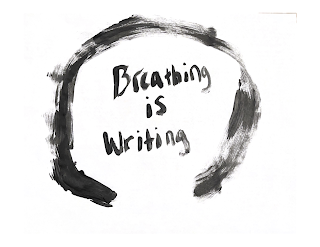Breathing is Writing
Dakota Coutu
Dakota Coutu is a junior at Salem State University majoring in psychology with a minor in criminal justice. While she not an English major, she finds writing to be a great way to express herself.
Breathing is writing. Breathing is fulfilling. Breathing is nourishment. Breathing is making room for new words. Every breathe allows for new words to escape from your body and onto the page in front of you.
When you inhale, you coat your thoughts and lungs with new thoughts and ideas. Those thoughts and ideas enter your blood stream and throughout your body. Creating new words to put onto paper. When you exhale your breathe leaves your body and is blown against the page in front of you coating it with the words from your inhale.
Mindfulness is “non-judgmental observation of the everchanging present moment”- John Kabat Zinn. Mindfulness is awareness. When one becomes mindful, they become non-judgmental. Mindfulness takes a lot of practice, and it is easy to forget to be mindful. When writers experience mindfulness, they may find that it is easier to write. This is because we take control over our monkey mind. The monkey mind is what causes us to become distracted and what causes writing suffering. The monkey mind makes judgments about us, and those judgments can positively or negatively influence our writing.
What exactly is the monkey mind?
Our monkey mind is our self-talk. It is the voice inside of our head. Our monkey mind can help us write but it can also be a big distraction for writing. Our monkey mind is responsible for our audience ghosts and our preconceptions. Our monkey mind takes us through mind weeds and mind waves.
According to Shunryu Suzuki, mind waves are thoughts that come and go. You notice them but you let them pass without judgment. Suzuki says that if you can be aware of your mind waves and let them go without bothering you, you will become calmer and feel more peaceful. This calmness can help tame the monkey mind and keep you on track for what you want to write about.
Mind weeds are when you do not let the mind wave simply pass. You attach yourself to the wave and you allow it to take you somewhere. You plant a seed that is nourished by the wave: this is when your monkey mind enters into storylines. Storylines can be extremely helpful for writers, but they can also be distracting.
It can be helpful for writers when it is a storyline of the topic that you are writing. It can give you new ideas and content to write about. However, if the monkey mind takes you on a mind weed that is not about your topic, it can be detrimental in your writing because it is a distraction.
Audience ghosts are not real, but they plague many writers.
Even writers who have written their entire lives and are professional writers have audience ghosts. Audience ghosts make writing very difficult for many writers and can even prevent writing in some cases. Audience ghosts are usually the person who you are writing for; however, a ghost can also be someone that you have written for in the past. This person has a lot of influence over your writing.
When you host an audience ghost, you will find that you are writing for them instead of yourself. Your audience ghost expects perfection, but it takes time to get to perfection.
This is why so many writers find it hard to write. They are expecting perfection before even writing any drafts because their audience ghost expects perfection. When you start to think about your audience ghost, you are no longer in the present, and that can hurt your writing.
If you can focus on just your breathing, your audience ghost goes away. You are no longer thinking about the future reader. Or maybe even a past reader who has given you a bad experience with writing. Your thoughts become focused on the here and now. When your monkey mind starts to think about your audience ghost you start to question your writing and it slows you down, maybe even stopping you.
The mantra Breathing Is Writing reminds you to focus on your own breathing. We are always breathing and when we focus on our breathing we are always in the present. The present is constantly changing meaning there are always things that you can write about. Each breath is like a clean slate making room for new words. You let your fears and insecurities go about your audience ghosts and you are able to focus on the present moment.
* Enso created by Dakota Coutu.

No comments:
Post a Comment